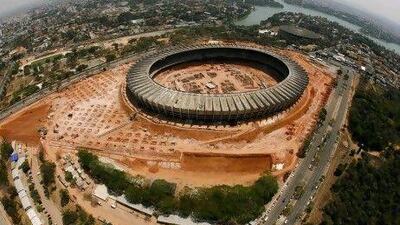It is a project that should symbolise the transformational benefits of hosting the 2014 Fifa World Cup - a sleek new monorail above Brazil's steamy Amazon city of Manaus.
Brazil: Adding it up
Stadium costs
But Athayde Ribeiro da Costa has a different take on it.
With just under 1,000 days before the first ball is kicked, the chief public prosecutor in Amazonas state sees the monorail as part of a trend of overspending and poor planning as Brazil rushes to make up for a slow start to its preparations.
"We are in favour of the Cup - it can bring lots of opportunities for people and help resolve infrastructure bottlenecks, but this can't be done at the expense of misuse of public funds or corruption," he says.
Concerns are mounting that Brazil's push to speed up its preparations for the global football showpiece risks fuelling corruption and an explosion of costs dwarfing other mega-events.
Last year's World Cup cost South Africa about US$4 billion (Dh14.69bn), but Brazil's official estimate already stands at about $13bn, including transport projects, stadium construction and airport expansions, making it certain the 2014 World Cup will be the most expensive in history.
Dilma Rousseff, Brazil's president, spoke in March of 33 billion reais (Dh67,17bn) of World Cup investments, and some private estimates are already far higher. This could put the final bill at an eye-popping $60bn by one estimate - bigger than the annual economic output of neighbouring Uruguay.
Legal cases are proliferating as prosecutors such as Mr da Costa investigate suspected overspending and abuses of bidding processes. He heads a group of 12 prosecutors focusing on World Cup cases - one for each host city - and says more than 80 civil investigations are under way.
The legal action could help save Brazilian taxpayers money but also risk causing yet more delays in a schedule that is already pushing the limits.
"If you make it more transparent, you might slow it down and therefore increase the costs," says Christopher Gaffney, a visiting professor of urbanism at Rio's Fluminense Federal University. "If you don't make it more transparent, you're guaranteed to increase the costs because everyone's going to have their hand in the till."
Delays have already drawn rebukes from world football's governing body, Fifa, and ruled out two of Brazil's 12 host-city stadiums being ready in time for the curtain-raising Confederations Cup in 2013.
The risks to the fragile timetable were rudely exposed this month when Ms Rousseff visited Belo Horizonte to start the 1,000-day countdown only to be greeted by a strike by workers building the south-eastern city's stadium.
Her government has injected some urgency into its World Cup plans, rushing through the Brazilian Congress in July a law that streamlines the bidding process for events related to the World Cup and the 2016 Olympic Games in Rio de Janeiro.
But that was a red flag for transparency groups and public prosecutors, who have slammed the change as opening the floodgates for overspending and corruption.
"The risks of having projects without the correct procedures and transparency are rising exponentially," says Caio Magri, a public policy adviser at the Ethos Institute, which works to promote corporate responsibility.
"The amount spent itself doesn't matter - 50bn reais would be very small to make up for what is lacking in Brazil's cities. It's not the size that's important, it's the legacy."
Roberto Gurgel, the prosecutor general, has asked the supreme court to declare the new bidding rules unconstitutional, saying they risk a large-scale repeat of the Pan-American Games in Rio in 2007, whose budget rose to 10 times the original estimate.
Back in 2009, the Brazilian Football Confederation estimated that refitting or building the 12 stadiums to be used for the World Cup would cost about 2.2bn reais - a figure that two years later seems quaint. The government now expects the cost to be more than triple that at 6.9bn reais.
Take the overhaul of the Maracanã stadium, which will host the World Cup final. Its budget has doubled since 2009 to 859 million reais.
Prof Gaffney calculates that as of May, stadium costs had risen by 27 per cent since 2009, based on lower estimates.
With construction costs and wages running high as annual inflation tops 7 per cent, further rises seem likely. Since January, the cost of World Cup projects has risen by more than 10 per cent to 26.5bn reais, according to a study by the Brazilian Senate.
Mr da Costa, the Manaus prosecutor, sees such forces at work in his city 4,300km north-west of Rio.
He insists the monorail project, budgeted at 1.46bn reais, was approved by state authorities without enough studies of potential demand, the number of stations or the fares for passengers.
"It will have uncountable additions with a big risk of being paralysed for lack of resources," he says.
* Reuters

